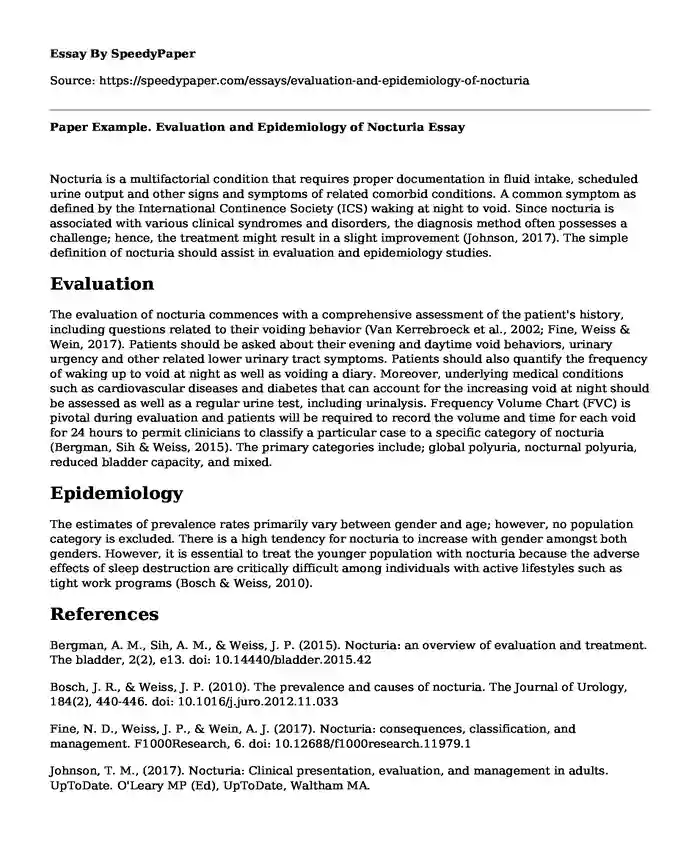Nocturia is a multifactorial condition that requires proper documentation in fluid intake, scheduled urine output and other signs and symptoms of related comorbid conditions. A common symptom as defined by the International Continence Society (ICS) waking at night to void. Since nocturia is associated with various clinical syndromes and disorders, the diagnosis method often possesses a challenge; hence, the treatment might result in a slight improvement (Johnson, 2017). The simple definition of nocturia should assist in evaluation and epidemiology studies.
Evaluation
The evaluation of nocturia commences with a comprehensive assessment of the patient's history, including questions related to their voiding behavior (Van Kerrebroeck et al., 2002; Fine, Weiss & Wein, 2017). Patients should be asked about their evening and daytime void behaviors, urinary urgency and other related lower urinary tract symptoms. Patients should also quantify the frequency of waking up to void at night as well as voiding a diary. Moreover, underlying medical conditions such as cardiovascular diseases and diabetes that can account for the increasing void at night should be assessed as well as a regular urine test, including urinalysis. Frequency Volume Chart (FVC) is pivotal during evaluation and patients will be required to record the volume and time for each void for 24 hours to permit clinicians to classify a particular case to a specific category of nocturia (Bergman, Sih & Weiss, 2015). The primary categories include; global polyuria, nocturnal polyuria, reduced bladder capacity, and mixed.
Epidemiology
The estimates of prevalence rates primarily vary between gender and age; however, no population category is excluded. There is a high tendency for nocturia to increase with gender amongst both genders. However, it is essential to treat the younger population with nocturia because the adverse effects of sleep destruction are critically difficult among individuals with active lifestyles such as tight work programs (Bosch & Weiss, 2010).
References
Bergman, A. M., Sih, A. M., & Weiss, J. P. (2015). Nocturia: an overview of evaluation and treatment. The bladder, 2(2), e13. doi: 10.14440/bladder.2015.42
Bosch, J. R., & Weiss, J. P. (2010). The prevalence and causes of nocturia. The Journal of Urology, 184(2), 440-446. doi: 10.1016/j.juro.2012.11.033
Fine, N. D., Weiss, J. P., & Wein, A. J. (2017). Nocturia: consequences, classification, and management. F1000Research, 6. doi: 10.12688/f1000research.11979.1
Johnson, T. M., (2017). Nocturia: Clinical presentation, evaluation, and management in adults. UpToDate. O'Leary MP (Ed), UpToDate, Waltham MA.
Van Kerrebroeck, P., Abrams, P., Chaikin, D., Donovan, J., Fonda, D., Jackson, S., Robertson, G. (2002). The standardization of terminology in nocturia: a report from the Standardisation Subcommittee of the International Continence Society. Neurourology and Urodynamics: Official Journal of the International Continence Society, 21(2), 179-183. https://doi.org/10.1002/nau.10053
Cite this page
Paper Example. Evaluation and Epidemiology of Nocturia. (2023, Jan 20). Retrieved from https://speedypaper.net/essays/evaluation-and-epidemiology-of-nocturia
Request Removal
If you are the original author of this essay and no longer wish to have it published on the SpeedyPaper website, please click below to request its removal:
- Essay Example: Business Communication and Corporate Culture in India
- Free Essay: Marketing the Disney Concept (MagicBand) to the Public
- Essay Sample on Protocols to Manage Nutritional deficiencies
- Research Proposal Example - Parenting in America
- Essay Example on Exploring Ethical Behavior and Integrity in Pearson Company
- Free Paper Example on the Impacts of Single Parenthood on Dutch Secondary Kids
- Essay Example - Educational Policy Analysis
Popular categories





